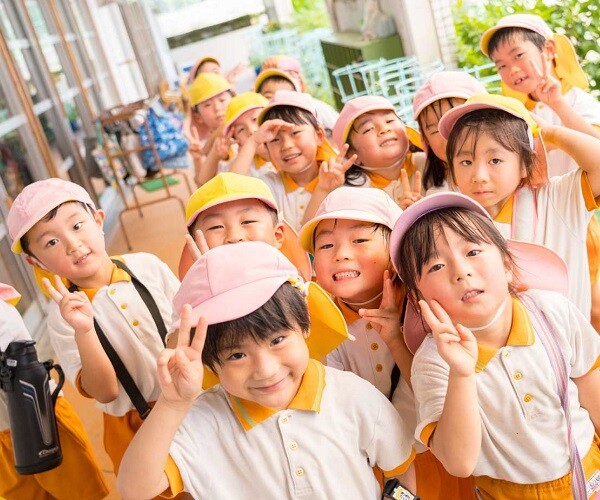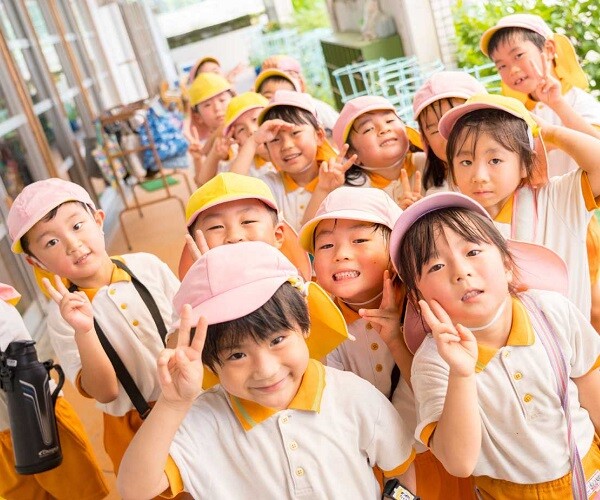The image of a child with tearful eyes, clinging to their parent’s shirt, tugs at the heartstrings of any parent. This heart-wrenching scene stems from the child’s tears and the parent’s concern about their child’s ability to adapt to a new environment.
In contrast, some children seamlessly adapt to new surroundings on their first day of school and even comfort their crying peers. This adaptability largely stems from their family upbringing.
According to an education expert, there are three types of family backgrounds that foster self-reliant children who don’t cry when they start kindergarten.


3 Family Factors That Influence a Child’s Mood When Starting Kindergarten

Harmonious and Cheerful Family Atmosphere
Children raised in a warm and harmonious family environment tend to develop a more optimistic and confident personality. Parental love and tolerance teach them how to get along with others.
These children are imbued with self-confidence. When faced with unfamiliar surroundings, they can quickly adjust their mindset and are less likely to develop a sense of dependence or fear.
Parents Who Frequently Take Their Children Outdoors
Parents who often take their children outdoors are more likely to foster independence and adaptability in their kids. Exposing children to diverse places, cultures, and environments broadens their horizons and strengthens their mental resilience.
When confronted with new surroundings, these children can remain calm and approach unknown situations without fear.

Parental love and tolerance lay the foundation for children to build harmonious relationships with others.
Family That Emphasizes Independent Education
While some parents shower their children with love, overprotection and excessive care can lead to dependency. As a result, when these children step out of their parents’ protective shell, they may feel lost.
On the other hand, children from families that encourage independence from an early age tend to be more confident when facing new environments. They are less intimidated by new surroundings and can quickly adapt while proactively facing challenges.

How to Help Children Adapt to a New Environment?
If parents want their children to smoothly transition into kindergarten, it’s essential to prepare them beforehand.
Here are some points for parents to consider:
Visit the Kindergarten Before Enrollment
When children first enter kindergarten, the unfamiliar environment can cause anxiety and unease. To facilitate early adaptation, parents can take their children on a tour of the kindergarten before enrollment, helping them become familiar with the classroom, teachers, and potential friends.
During this visit, children can absorb the atmosphere and form a mental concept of the school, reducing the sense of strangeness and fear on the first day.
Foster Your Child’s Independence
Whether it’s eating, sleeping, dressing, or tidying up, parents can encourage independence by incorporating small training exercises into daily life.
After starting school, children need to learn how to perform basic life tasks independently.
If children are trained to a certain degree of independence before kindergarten, they will be better equipped to take care of themselves and seamlessly blend into the collective life at school.
Enhance Social Skills
In addition to independence, social skills play a pivotal role in adapting to school life. Parents should help their children build confidence in communicating with peers by arranging playdates and social interactions.
If children possess some social skills before entering kindergarten, they will find it easier to make friends.
The warmth of the family, along with parental guidance and companionship, lays the foundation for a healthy psychological foundation, fostering independence and adaptability. These qualities need to be firmly established before children enter school.
For parents, sending their children to kindergarten marks a new phase in their development, reflecting each family’s unique parenting philosophy.
By focusing on fostering independence in daily life, regularly exposing children to the outside world, and helping them adapt to new environments, parents can empower their children to overcome the challenges of early education.

Enhancing social skills prepares children for school.
When children enter kindergarten equipped with the right tools and a solid foundation from their family, they can swiftly adapt and confidently interact with their peers and teachers.
Empirical evidence suggests that children who receive comprehensive early development tend to be more successful in their academic and future endeavors.
Thus, by building a robust foundation through parental care and support, children can smoothly navigate this transitional phase, paving the way for a fascinating journey of learning and exploration.
The Five Facial Features of Prosperity: A Guide to Unlocking Your Fortunate Destiny
“The ancient text of “Dich Kinh” and the study of physiognomy reveal that certain facial features are indicators of a person’s destiny. Those with these blessed characteristics are said to be born with a fortunate life, destined to enjoy the blessings of wealth and prosperity. Are you one of these fortunate few? Discover if your face reflects the 5 signs of a privileged life, as outlined in the ancient art of physiognomy.”



































